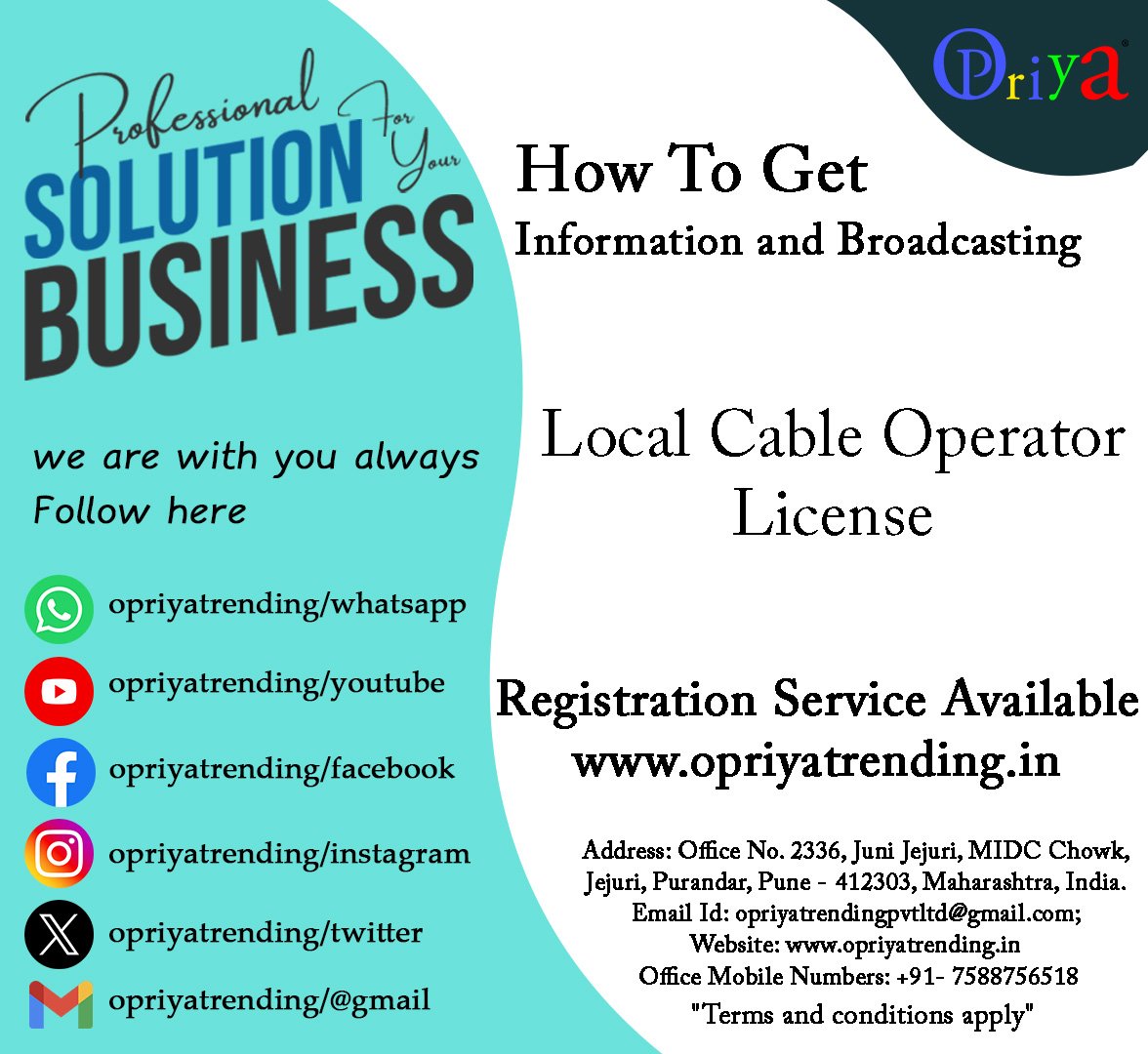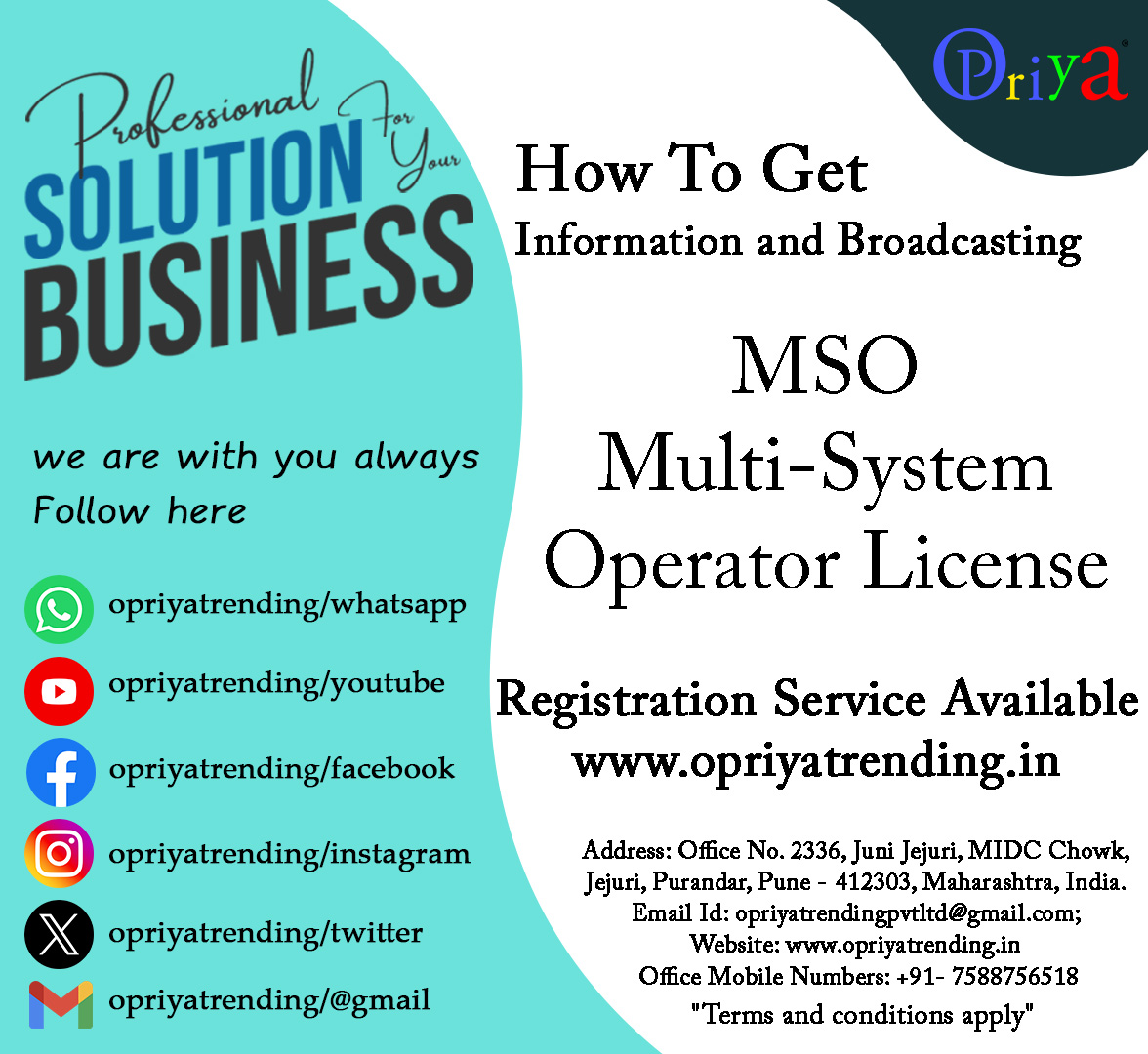Trusted DTH Operator Registration
Table of Contents
✅ DTH Operator Registration
DTH Operator Registration is a mandatory compliance process regulated by the Ministry of Information and Broadcasting (MIB) for any individual or organization aiming to offer Direct-to-Home broadcasting services in India. The purpose of DTH Operator Registration is to ensure lawful operations, secure signal transmission, adherence to national broadcasting guidelines, and promote responsible content delivery.
If you plan to start your own DTH service, distribute satellite content, or collaborate with broadcasters as a platform operator, DTH Operator Registration is your first official step. In 2025, the demand for legally operating DTH platforms is growing rapidly, and the licensing system ensures your operations meet all mandatory technical and legal criteria.
Many new entrepreneurs and established telecom brands are actively entering this booming sector, and registering as a DTH Operator provides not just regulatory approval but also a mark of credibility. Through DTH Operator Registration, you gain legal recognition, access to satellite bandwidth, and technical support permissions — making it the cornerstone of your broadcasting business in India.
O’Priya Trading Pvt Ltd offers you end-to-end guidance for DTH Operator Registration, enabling you to apply with full confidence, especially in 2025 where digital and satellite viewership is at its all-time high.
📘 Types of Licenses Offered Under DTH Operator Registration
DTH Operator Registration encompasses multiple types of licensing services depending on the size, purpose, and structure of your broadcasting business. Here’s a breakdown:
- New DTH License: For first-time applicants who wish to establish a Direct-to-Home broadcast service.
- DTH Platform Extension License: For operators who already possess a license and intend to expand into new regions or upgrade their infrastructure.
- Multi-System Operator (MSO) DTH License: For MSOs who want to combine cable and DTH distribution via hybrid platforms.
- Foreign Collaboration DTH License: For joint ventures or foreign-invested firms, subject to FDI norms under MIB.
- Renewal DTH License: For operators whose license is nearing expiry, and wish to renew their authority to operate.
Each of these licenses under DTH Operator Registration serves specific commercial or regional purposes and involves unique documentation and eligibility criteria.
👥 Who Needs DTH Operator Registration?
DTH Operator Registration is a legal prerequisite for anyone intending to provide satellite-based television services directly to consumers without intermediary cable infrastructure. Examples include:
- Entrepreneurs launching new DTH platforms
- Broadcast service providers expanding their offerings
- Cable TV operators entering the DTH market
- Businesses offering digital broadcast via satellites
- Investors collaborating with international DTH partners
Whether you’re setting up a small-scale regional DTH station or a pan-India DTH broadcasting company, securing DTH Operator Registration is essential.
💼 Why Choose O’Priya Trading Pvt Ltd for DTH Operator Registration?
O’Priya Trading Pvt Ltd is your trusted compliance and licensing partner for DTH Operator Registration. Here’s why clients across India prefer us:
- 10+ years of experience in licensing & telecom regulatory services
- Expert legal team familiar with MIB, TRAI, and DOT requirements
- Dedicated support from application to final approval
- Affordable and transparent pricing
- 100% confidentiality and data protection
Choosing O’Priya ensures that your DTH Operator Registration is filed accurately, documents are complete, and responses to queries from authorities are timely and professional. We help you avoid delays and rejections, giving you confidence in your broadcasting journey.
📝 DTH Operator Registration Process (Step-by-Step)
Our team at O’Priya Trading Pvt Ltd simplifies the entire process of DTH Operator Registration. Here’s how it works:
- Initial Consultation – Understand your business model and suggest the appropriate DTH license type.
- Documentation Checklist – We provide you with a comprehensive list of documents needed.
- Application Drafting – Our team prepares a technically correct and legally sound application.
- Filing with MIB – Submit your DTH license application online via the Broadcast Seva Portal.
- Query Resolution – Handle clarifications or document revisions raised by the Ministry.
- Fee Submission – Ensure all statutory and application fees are submitted correctly.
- Technical Compliance Review – Assist in satisfying satellite bandwidth, encryption, and uplinking requirements.
- Final Approval – Upon verification, your license is granted officially.
Each step is crucial, and our proven process ensures smooth and timely DTH Operator Registration in 2025.
📄 Required Documents for DTH Operator Registration
Here’s a list of documents typically required for DTH Operator Registration:
- Incorporation Certificate of the applicant company.
- Board Resolution authorizing the license application.
- Memorandum and Articles of Association (MOA/AOA)
- Shareholding Pattern
- Net Worth Certificate from a Chartered Accountant
- Technical Plan outlining uplinking/downlinking mechanisms
- Satellite Lease Agreement or bandwidth allocation proof
- Undertaking regarding Foreign Direct Investment (FDI) compliance
- Security Clearance Certificates (if applicable)
- Payment Proofs of processing and registration fee
Providing clear, authentic, and complete documents ensures your DTH Operator Registration proceeds without unnecessary delays.
💰 Cost Involved in DTH Operator Registration
The professional and statutory cost for DTH Operator Registration includes the following:
- Consultation and Application Drafting Fee – ₹35,000 to ₹50,000
- Processing Fee (MIB) – As per government norms (approx ₹10 lakh for new license)
- Legal Documentation Charges – ₹10,000 to ₹15,000
- Satellite Coordination Costs – Varies based on satellite provider
O’Priya Trading Pvt Ltd offers tailored packages depending on your project size. Reach out today for a custom quote.
💸 Payment Refund Policy (Transparent & Clear)
Please note: DTH Operator Registration fees are non-refundable.
However, at O’Priya Trading Pvt Ltd, we offer a 30-day processing guarantee. If we fail to initiate your application within this period due to our internal issues, we offer a 100% refund of the service fee.
Government and statutory fees once paid cannot be refunded under any circumstances.
📜 Terms and Policy
By choosing O’Priya Trading Pvt Ltd for DTH Operator Registration, you agree to:
- Share accurate and truthful documents
- Comply with all MIB and TRAI regulations
- Acknowledge non-refundable fee structure
- Maintain communication throughout the process
Your privacy and confidentiality are always protected.
⏱️ Time Taken for DTH Operator Registration
The average time required for DTH Operator Registration in India is:
- Document Preparation – 5 to 7 working days
- Application Filing & Submission – 3 to 5 working days
- MIB Review and Query Resolution – 4 to 6 weeks
- Final License Issuance – 60 to 90 days
These timelines may vary depending on the completeness of documents and responsiveness of the applicant.
⚠️ Common Mistakes to Avoid in DTH Operator Registration
Avoid these costly mistakes while applying for DTH Operator Registration:
- Submitting incomplete or outdated documents
- Not adhering to satellite and uplink regulations
- Using improper legal formats for resolutions
- Ignoring FDI limits and security clearances
- Choosing the wrong license type
Our professional team helps you eliminate such errors and ensure a smooth approval process. Incomplete applications often lead to rejection — don’t let that happen to your project.
📞 Call-to-Action (CTA)
📧 Email us at: opriyatrendingpvtltd@gmail.com
📲 WhatsApp us: +91 7588756518 Click to Chat
📘 Facebook: facebook.com/opriyatrending
🌐 Visit us: opriyatrending.in
👉 Apply for your DTH Operator Registration today with full confidence!
🛡️ 100% Professional Support | ✅ Guaranteed Documentation | 🕒 Fast Processing
❓ Frequently Asked Questions (FAQs)
1. What is DTH Operator Registration?
It is a mandatory license granted by the Ministry of Information & Broadcasting to legally operate a Direct-to-Home broadcast service in India.
2. Is it mandatory to get a DTH license in India?
Yes, operating without a license is illegal and may lead to fines or a complete shutdown of services.
3. How long is the license valid?
Typically, the license is valid for 10 years and is renewable based on compliance.
4. Can a foreign company apply for DTH Operator Registration?
Yes, but only under certain FDI limits and after receiving security clearance from concerned authorities.
5. What happens if my application is rejected?
You can reapply after correcting issues or seek professional help to appeal or reprocess the application.
6. What is the role of TRAI in DTH licensing?
TRAI ensures tariff and content regulations, while the MIB issues licenses.
7. Can I convert my cable TV service to a DTH platform?
Yes, but you need to secure the DTH license and meet satellite and technical standards.
8. Is O’Priya Trading authorized to help with DTH licensing?
Yes, we are a leading consultant for telecom and broadcast licenses in India.
9. How do I check the status of my application?
You can check on the Broadcast Seva Portal or contact our team for real-time updates.
10. What if I don’t have technical staff for setup?
We can connect you with verified satellite and uplink vendors for full support.
O’Priya Trading Private Limited: All India License Registration Service Provider
In today’s complex regulatory landscape, obtaining licenses and regulatory approvals in India has become more essential than ever for businesses, institutions, and individuals. Whether it’s an arms license, FSSAI registration, company incorporation, or compliance with the latest government norms, having the right license determines your legitimacy, credibility, and operational capacity.
One company leading this transformation by providing seamless, reliable, and legally compliant license registration services across India is O’Priya Trading Private Limited. With a strong commitment to transparency, process efficiency, and client satisfaction, O’Priya Trading Pvt. Ltd. has emerged as a trusted name in the Indian licensing domain.
🔷 Company Overview
Legal Name: O’Priya Trading Private Limited
Nature of Business: License Registration, Compliance Advisory, Government Liaison Services
Operational Scale: Pan-India
Head Office: Registered in India, with service availability across all states and union territories
📞 Call-to-Action (CTA) – Apply Now with Confidence!
Ready to secure your Licence Apply with Full Confidence in All Indiaa?
👉 Contact Us Today!
📧 Email: opriyatrendingpvtltd@gmail.com
📱 WhatsApp: +91 7588756518🔗 Website: https://opriyatrending.in👍 Facebook: O’Priya Trading Pvt Ltd
Apply with Full Confidence in 2025.
🏛️ What Does O’Priya Trading Pvt Ltd Do?
O’Priya Trading Private Limited specializes in license registration services across India, offering a full range of end-to-end solutions to institutions, businesses, and individuals seeking regulatory permissions and licenses. From document preparation to submission, legal verification, and post-approval compliance, they serve as a single-window license consultancy provider.
🗺️ Pan-India Service Coverage
What makes O’Priya Trading unique is its all-India licensing facilitation network. Unlike regional agencies that operate within narrow jurisdictions, O’Priya has built an operational capacity to deliver services in every Indian state and union territory.
🌍 States Served Include:
- Delhi, Maharashtra, Uttar Pradesh, Gujarat, Rajasthan, Madhya Pradesh, Karnataka, Tamil Nadu, Kerala, Telangana, Punjab, Haryana, Assam, West Bengal, Bihar, Jharkhand, Odisha, Chhattisgarh, and more.
🏢 Cities with Active Clients:
- Mumbai, Pune, Delhi, Hyderabad, Bangalore, Kolkata, Ahmedabad, Chennai, Jaipur, Lucknow, Bhopal, Indore, Surat, Patna, and others.
Through a digital-first approach, coupled with experienced local legal liaisons, O’Priya ensures consistency in documentation, faster government approvals, and responsive client support.
💡 Why Clients Trust O’Priya Trading Pvt Ltd
1. ✅ Transparency & Ethics
🔒 100% Transparent | No Hidden Fees | Pan-India Services We believe in:
- Clear timelines
- Upfront pricing
- Honesty about payment policies (non-refundable, refundable, no surprises)
- Total confidentiality
2. 🧾 Documentation Expertise
Most license applications are delayed due to incomplete, incorrect, or improperly formatted documents. O’Priya’s legal consultants help you prepare foolproof documentation as per the latest formats demanded by regulatory bodies.
3. 🧑⚖️ Government Liaison
Whether it’s a district magistrate’s office, arms licensing authority, food safety department, or ROC office, O’Priya has built solid working relationships with relevant departments across states.
4. 🚀 Quick Turnaround
With strong process knowledge and digital tools, O’Priya delivers faster application submissions, consistent follow-ups, and streamlined approvals—ensuring minimal disruption to your business.
5. 💬 Client-Centric Support
They offer multi-channel communication: WhatsApp, email, video calls, and in some cases, in-person assistance. Clients are never left guessing about the status of their application.
📂 Service Flow: How It Works
Step 1: Free Consultation
Client reaches out via WhatsApp or email. A dedicated case manager responds with guidance and documentation checklist.
Step 2: Document Compilation
The team helps the client gather and format all required documents—identities, justifications, organizational registrations, etc.
Step 3: Application Filing
Forms are filled and submitted either physically or digitally, depending on the department’s workflow.
Step 4: Verification Support
Whether it’s a police inquiry or local office inspection, the team ensures you’re prepared and compliant.
Step 5: Approval & Delivery
Once approved, the license or certificate is collected and shared with the client via secure channels. Renewals and annual compliances are also managed, if opted for.
🔍 Industries Served
| Industry | Licenses Provided |
| Security | PSARA, Arms License |
| Food & Beverages | FSSAI, Shop Act, GST |
| Manufacturing | Factory License, Pollution NOC |
| Healthcare | Drug License, Biomedical Waste License |
| Retail & E-commerce | GST, MSME, Trademark |
| Education/Training | Arms License (Training), ISO, Accreditation support |
This industry-specific approach helps clients get exactly what they need—no more, no less.
📊 Success Metrics (As of 2025)
- ✅ 4,000+ Licenses Approved
- ✅ 95% Success Rate on First Submissions
- ✅ 100+ Cities Served
- ✅ 40+ License Categories Covered
- ✅ 500+ Institutional Arms Licenses Facilitated
🔄 Annual Compliance Services
Beyond just registration, O’Priya also offers post-licensing support, such as:
- Annual license renewals
- Change of address or ownership updates
- Firearms inspection audit preparation
- Document maintenance and digital filing
- Regulatory upgrades (as per rule changes)
This holistic approach ensures clients remain compliant even after license issuance.
📌 Why Choose O’Priya Over Others?
| Feature | O’Priya Trading Pvt Ltd | Typical Local Agent |
| Service Reach | Pan-India | Limited to district/state |
| Process Transparency | High (With Updates) | Often vague or hidden |
| Legal Expertise | Qualified Advisors | Informal guidance |
| Communication | Email, WhatsApp, Call | Mostly phone |
| Refund/Policy Clarity | Documented Terms | Unclear or non-existent |
| Renewal Reminders | Included | Rarely provided |
For businesses and institutions who cannot afford non-compliance or delays, O’Priya offers institutional-grade service quality at competitive prices.
🧭 Vision and Future Outlook
O’Priya Trading Pvt Ltd envisions becoming India’s most trusted regulatory compliance partner. With ongoing investments in:
- AI-based document automation
- Online dashboards for tracking license status
- Partnerships with regional lawyers and consultants
- Digital KYC and identity verification tools
…they aim to make India’s license ecosystem simpler, faster, and corruption-free.
Call-to-Action (CTA) – Apply Now with Confidence!
Ready to secure your Licence Apply with Full Confidence in All Indiaa?
👉 Contact Us Today!
📧 Email: opriyatrendingpvtltd@gmail.com
📱 WhatsApp: +91 7588756518🔗 Website: https://opriyatrending.in👍 Facebook: O’Priya Trending Pvt Ltd
Apply with Full Confidence in 2025.
🛡️ Legal. Reliable. Fast. That’s the O’Priya Promise.
📋 List of Services (with Reconstructed Links)
Below is the categorized list of services as per the website’s usage index. Where possible, we’ve added direct or pattern-based links.
1. Arms License Services
- Arms for Individual License Registration
- Arms for Institution License Registration
- Arms for Sports License Registration
- Arms for Dealers License Registration
- Weapons Manufacturing License Registration
2. AYUSH License
- AYUSH Loan & Others License
- AYUSH Manufacturing License
- AYUSH Distribution License
- AYUSH Clinic License
- AYUSH Retail License
3. BIS/ISI/ISO Certifications
4. Compulsory Registrations
- MSME/Udyam Registration
- Startup India Registration
- FSSAI Registration (Central/State)
- Legal Entity Identifier Code
- Trade License
- Fire License
- Digital Signature
- ICEGATE Registration
- FCRA Registration
- 80G and 12A Registration
5. DOT/Telecom Licenses
- ISP License
- NLD/ILD License
- UL VNO License
- PM-WANI Registration
- SACFA Clearance
- IP-1 Registration
- TEC Certificate
- AGR Return Filing
6. Drug License
7. Electrical License
8. GST & Taxation
9. IPR Services (Trademark, Copyright, Patent)
- Trademark Registration
- Trademark Objection Reply
- Patent Filing (Provisional/Complete)
- Copyright Registration
- Design Registration
10. Liquor License
11. MCA Services
- Private Limited Company Registration
- LLP Registration
- OPC Registration
- Annual MCA Compliance
- Company Closure
12. PESO License
13. PSARA License
14. Pollution Control
15. Regulatory Bodies
- NBFC Registration (RBI)
- FFMC & P2P Lending
- Legal Metrology Packager License
- IRDAI Corporate Agent License
📞 Contact O’Priya Trading Pvt Ltd Today
👉 Contact Us Today!
📧 Email: opriyatrendingpvtltd@gmail.com
📱 WhatsApp: +91 7588756518🔗 Website: https://opriyatrending.in👍 Facebook: O’Priya Trending Pvt Ltd
🛡️ Legal. Reliable. Fast. That’s the O’Priya Promise.
💖 Why opriyatrending.in is More Than Just a Service Platform
In a country as vast and complex as India, navigating government registrations can feel overwhelming, stressful, and even hopeless at times. But opriyatrending.in doesn’t just offer “services.” It offers reassurance, clarity, and a sense of control—when you need it most.
🛑 The Fear of Rejection, Delays, and Loss
You might have tried applying for licenses yourself before—endless documents, non-responsive departments, confusing portals. It can leave you feeling:
- ❌ Lost in bureaucracy
- ❌ Afraid your business will never take off
- ❌ Unsure who to trust
O’Priya Trading Pvt. Ltd. understands this fear—and fights it by giving you the guidance you were never offered before.
💪 A Partner in Your Growth Journey
Whether you’re a dreamer starting your first startup, a farmer protecting your land, a doctor opening a clinic, or a dealer building your future—this company walks beside you.
- They help you register your identity
- They protect your investment
- They stand between you and the wall of red tape
When opriyatrending.in helps you get your license, they’re not just checking boxes. They’re helping you move forward with confidence.
🧠 A Calm Voice When Everything Feels Chaotic
In a system full of delays, errors, and vague processes, opriyatrending.in offers:
- 🧾 Clear documentation guidance
- 🕐 Honest timelines
- 📞 A human voice when you call or WhatsApp
When you’re in a crisis—whether it’s a license rejection or urgent compliance—they don’t ignore you. They respond. They care.
🌱 Your Dreams Deserve to Be Legal, Protected, and Empowered
Every license, every registration, every clearance—represents a life goal.
It’s your right to:
- Own a weapon for protection
- Start a small company
- Launch a new StartUp company
- Open a food business legally
- Register a company and pass it on to your children
Opriyatrending.in ensures that no dream is delayed because of red tape.
🔗 It’s Not Just a Website It’s a Lifeline.
📍 When you open opriyatrending.in, you’re not just clicking on a page.
You’re saying:
“I’m ready to take a step toward my dream, but I need help.”
And that’s exactly what O’Priya Trading Pvt. Ltd. is here for.
📞 Contact O’Priya Trading Pvt Ltd Today
👉 Contact Us Today!
📧 Email: opriyatrendingpvtltd@gmail.com
📱 WhatsApp: +91 7588756518🔗 Website: https://opriyatrending.in👍 Facebook: O’Priya Trending Pvt Ltd
🛡️ Legal. Reliable. Fast. That’s the O’Priya Promise.





